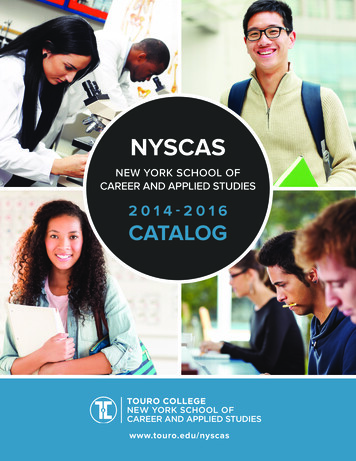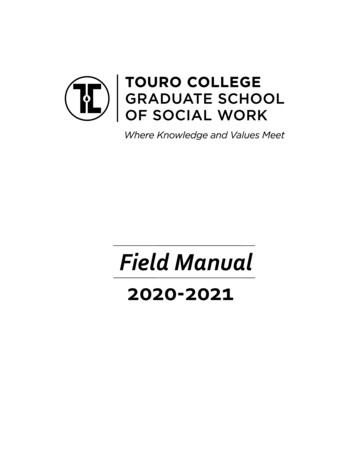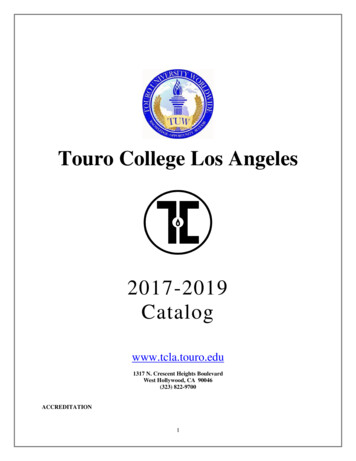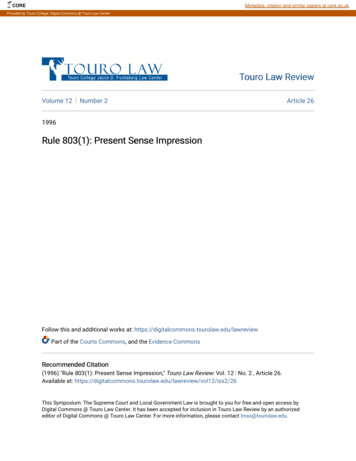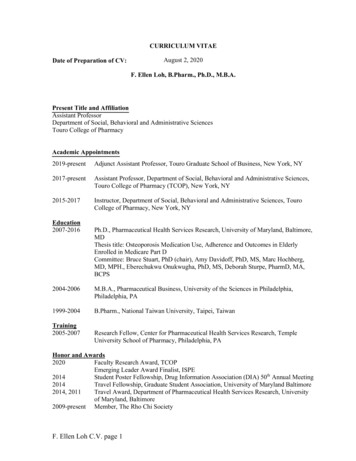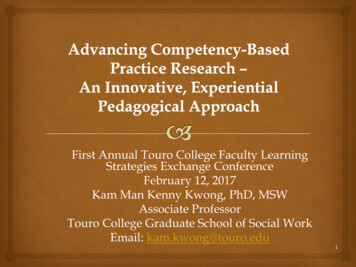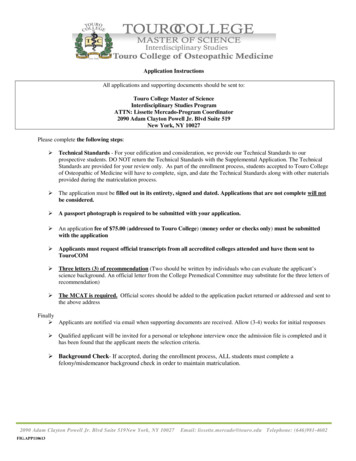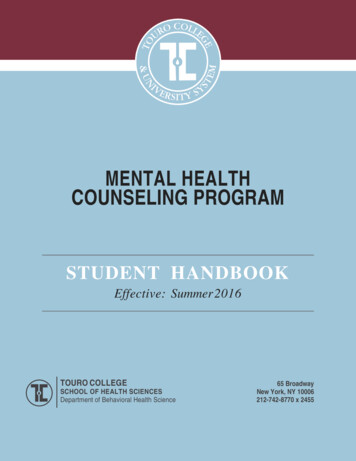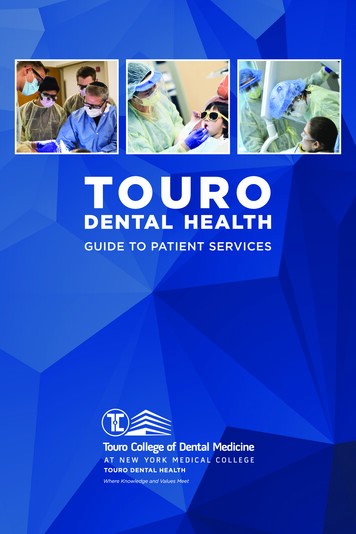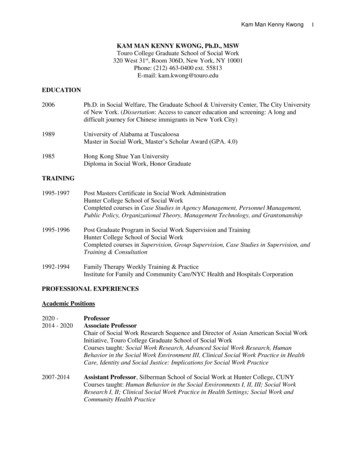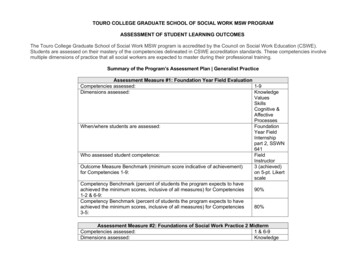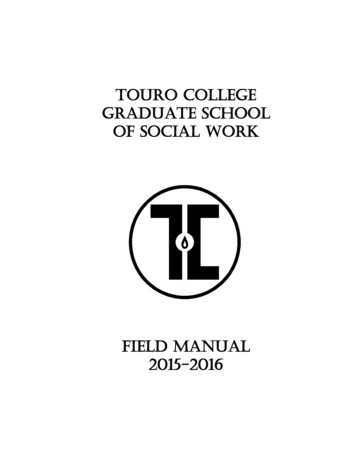
Transcription
TOURO COLLEGEGraduate schoolOF SOCIAL WORKFIELD MANUAL2015-2016
IMPORTANT NOTICEThis Field Manual contains only general guidelines and information. It is not intended to be comprehensive or to address all thepossible applications of, or exceptions to, the policies and procedures of Touro. This Manual will be considered to be in effect untilthe publication of the next Manual. Some of the subjects described in this Manual are covered in detail in official policy andprocedure documents found online and elsewhere. You should refer to these documents for specific information, since this Manualonly briefly summarizes those policies. For that reason, if you have any questions concerning a particular policy or procedure, youshould address your specific questions to the Office of Institutional Compliance. Please note that the terms of the full officialpolicies are controlling in the case of any inconsistency.This Manual is neither written nor meant to confer any rights or privileges on students or impose any obligations on Touro. Noindividual or representative of Touro (except the President) has the authority to enter into any agreement or understanding contraryto the above.This Manual is written for informational purposes only and may contain errors. The policies, procedures and practices describedherein may be modified, supplemented or discontinued in whole or in part, at any time with or without notice. All changes will beposted on the Touro website. Although we will attempt to inform you of any changes as they occur via the Touro email addressassigned to you upon activating your myTouro portal account, it is nevertheless your responsibility to keep current on all Collegepolicies, procedures and practices. Your assigned Touro email address is the official method of contact for all such notices and forall Touro communication.Students are required to investigate for themselves as to whether the program they enroll in meets their personal, educational andcareer needs. Different jurisdictions have different licensing requirements and standards. While students may expend significantsums associated with higher education, successful completion of a course, program, or degree is dependent on many factors. Thepayment of tuition permits a student to register and take the courses and programs available and offered by the Touro school orprogram in which the student is enrolled. Acceptance in a school or program does not form the basis of a contract. Indeed astudent’s acceptance may be revoked if it is later learned, among other things, that his or her qualifications have been misstated oroverstated, or there is some other omission or misrepresentation. Except as noted in the paragraph below, no contract rights exist orare established in the student- educational institution setting by and between Touro and the student. To this end, you waive andTouro disclaims any contract or liability for promises, assurances, representations, warrantees, or other statements made in itsmarketing or promotional materials, and makes absolutely no promises, assurances, representations, guarantees, warrantees or otherstatements concerning our courses and programs and a student's academic success in them. Thus, you waive and Touro furtherdisclaims any liability in tort in connection with any of the foregoing. In order for a degree to be earned, the required grades andgrade point averages must be achieved and maintained, and all other requirements of the school and program must be fulfilled.These disclaimers are, in effect, covenants not to sue binding on students, and are tacitly agreed to by a student’s matriculation orcontinued matriculation in our programs.Registration and matriculation at Touro after the issuance of this Manual is consideration for and constitutes a student's knowingacceptance of the binding Alternative Dispute Resolution ("ADR") mechanisms (including binding arbitration) contained herein.Thus, any dispute, claim or controversy arising out of or related to your application, registration, matriculation, graduation or otherseparation from Touro and/or this Manual, which is not resolved through Touro's internal mechanism shall be exclusively resolvedthrough final and binding expedited arbitration conducted solely before the American Arbitration Association ("AAA"), or anysuccessor in interest, in accordance with the AAA Rules then in effect. The location of the arbitration shall be at a convenient officeon a Touro campus where the student is (or was last) affiliated. See "Arbitration of Disputes" provision for a more elaboratetreatment.Policy of Non-DiscriminationTouro College treats all employees, students, and applicants, without unlawful consideration or discrimination as to race,creed, color, national origin, sex, age, disability, marital status, genetic predisposition, sexual orientation, gender identityor citizen status in all decisions, including but not limited to recruitment, the administration of its educational programs andactivities, hiring, compensation, training and apprenticeship, promotion, upgrading, demotion, downgrading, transfer, layoff, suspension, expulsion and termination, and all other terms and conditions of admission, matriculation andemployment.thInquiries or complaints concerning the non-discrimination policies should be sent to Elan Baram, 500 7 Avenue, 4thFloor, New York, New York, 10018, USA, Elan.Baram@touro.edu (646-565-6000, ext. 55636) or, alternatively, to theChief Compliance Officer at compliance@touro.edu and 646-565-6000, ext. 55330.
Table of ContentsPageAdministration3Faculty & Field Liaisons4Field Education Calendars5CSWE Core Competencies7Purpose of the Manual8The Role of Field EducationIntegrative Practice Field Seminar89The Field Education DepartmentField Objectives99Field Placement OverviewWhat is Clinical Social Work?The Placement ProcessSteps in Securing a Field PlacementCriteria for Field Placement Selection1010101111Seminar in Field Instruction (SIFI)13Student Field ResponsibilitiesSchedule and AttendanceOther Student ResponsibilitiesStudent Availability for Field WorkPolicies and ProceduresProcess RecordingsRole of Touro Field Liaisons in Field Work13131414141516Evaluations16Grades17Resolving Student Concerns17Graduate Student Review Committee18College Codes & PoliciesSatisfactory Academic ProgressArbitration of DisputesFailure to Educate & Liability DisclaimerPolicy on Bias, Harassment, & DiscriminationTitle IX PolicyPolicy on Sexual OffensesTouro College Sexual Assault Prevention PoliciesStudent Complaint PolicyStudent Complaint Procedure PhasesTouro College Campus Security PoliciesPolicy on Drugs & Controlled Substances1919192121222324252627281
Student Responsibilities and RightsStudents with DisabilitiesCampus CitizenshipStandards of Classroom BehaviorComputer Use PolicyInternet and E-Mail PolicyAnti-Hazing RegulationsNon-Smoking PolicyConfidentiality of Student Education Records (FERPA)Authorization for Non-Disclosure of Directory Information31313232323333333335APPENDIX36Semester Tracking Form for Field Work AssignmentEducational Plan OutlineCriteria for Eligible Field PlacementsCriteria for Eligible Employment-Based Field PlacementsField Placements – Frequently Asked QuestionsEmployment-Based Field AgreementSample Format for Process RecordingSample Portion of a Process Recording2
TOURO COLLEGE GRADUATE SCHOOLOF SOCIAL WORK27 WEST 23RD STREET, NEW YORK, NY 10010ADMINISTRATIONSteven Huberman, PhDDean212-463-0400 ext. 5278steven.huberman@touro.eduMelissa Earle, LCSW, PhDAssociate Dean, Administration & Program Initiatives212-463-0400, ext. 5137melissa.earle@touro.eduNancy Lee Gallina, MSW, PhDAssociate Dean & Director of MSW Program212-242-4668, ext. 5810nancy.gallina@touro.eduTina Atherall, MSW, LMSWDirector of MSW Recruitment, Outreach and EnrollmentManagement212-463-0400 ext. 5630tina.atherall@touro.eduAllison Bobick, MSW, LCSWDirector of Student Advancement212-463-0400 ext. 5373allison.bobick@touro.eduSusan Brot, MSW, LMSWAssociate Director of Field Education & Academic Advisement212-463-0400 ext. 5798susan.brot@touro.eduDenise Holguin, MSED, MSAssistant Director of MSW Recruitment & Enrollment Management212-463-0400 ext. 5376Eric Levine, MSW, DSW, LMSWDirector, Social Work Alumni Engagement &Financial Resource Development212-463-0400 ext. 5195eric.levine@touro.eduElhanan Marvit, MSW, LCSWCoordinator, Brooklyn Div., Director of Administrative Services212-463-0400 ext. 5542elhanon.marvit@touro.eduRoberta Shiffman, MSW, LMSWDirector of Field Education,Community Partnership Development & Academic Advisement212-463-0400 ext. 5543roberta.shiffman@touro.eduDorrine Veca, MS, MPH, LCSWAssistant Director of Field Education212-463-0400 ext. 5424dorrine.veca@touro.eduAnnalene Antonio, MSW, LMSWExecutive Assistant to the Dean212-463-0400 ext. 5540annalene.antonio@touro.eduSarala Kislak, MSW, LMSWAdministrative Coordinator, Brooklyn Learning Extension212-463-0400 ext. 36347sarala.kislak@touro.eduAndrea Kugielska, BSAdministrative Coordinator of Field Education & Advisement212-463-0400 ext. 5502andrea.kugielska@touro.eduElba Rodriguez, BAExecutive Assistant to the Associate Dean & Directorof the MSW Program & to the Director of Student Advancement212-463-0400 ext. 5342elba.rodriguez20@touro.eduFrancesca Tindal, BS, MBAExecutive Assistant to the Associate Dean, Administration &Program Initiatives212-463-0400 ext. 5263francesca.tindal@touro.eduKian Williams, BAAdmissions Assistant212-463-0400 ext. 5269kian.williams27@touro.edu3
FACULTYAnnecy Baez, Ph.D.212-242-4668 x 5815annecy.baez3@touro.eduAllison Bobick, MSW, LCSW212-463-0400 x 5373allison.bobick@touro.eduMelissa Earle, MSW, Ph.D., LCSW212-463-0400 x 5137melissa.earle@touro.eduSusan Brot, LMSW212-463-0400 x 5798susan.brot@touro.eduNancy Feldman, MSW, MCAT, PhD212-242-4668 x 5814nancy.feldman@touro.eduNancy Lee Gallina, MSW, Ph.D., LCSW212-242-4668 x 5810nancy.gallina@touro.eduSteven Huberman, Ph.D.212-463-0400 x 5278steven.huberman@touro.eduSteven Krantz, MSW, DSW, LCSW212-242-4668 x 5812steven.krantz@touro.eduKam Man (Kenny) Kwong, LMSW, PhD212-242-4668 x 5813kam.kwong@touro.eduElhanan Marvit, MSW, LCSW212-463-0400 x 5542elhanan.marvit@touro.eduFolusho Otuyelu, LCSW, Ph.D.212-242-4668 x 5816folusho.otuyelu@touro.eduRoberta Shiffman, MSW, LMSW212-463-0400 x 5543roberta.shiffman@touro.eduDorrine Veca, MS, MPH, LCSW212-463-0400 x 5424dorrine.veca@touro.eduJennifer Zelnick, MSW, ScD212-242-4668 x 5811jennifer.zelnick@touro.eduFIELD LIAISONSEva Bernfeld, LCSW****Darlene Carrera, LCSW****Ilise Fay, LCSW-R****Melissa Halpern-Rojas, LMSW, LCSW**Keyowanna Hammonds, LCSW**Morris Heney, LMSW**morris.heney@touro.eduSarala Kislak, LMSW**sarala.kislak@touro.eduSteven Krantz, LCSW, DSWmelissa.halpern-rojas2@touro.edu**212-242-4668 x 5812steven.krantz@touro.eduJoan Krystal-Levy, LMSW**joan.levy10@touro.eduElisheva Lock, LMSW****Catya Righetti, LCSW-R****Hedy Rubel, LMSW****** For phone and/or email information, please contact Andrea Kugielska – 212-463-0400 x 5502 orandrea.kugielska@touro.edu4
TOURO COLLEGE GRADUATE SCHOOL OF SOCIAL WORK2015-2016 FIELD CALENDAR - FULL TIME (21 HOURS WEEKLY)Tuesday, September 8Mon, Sept 14 – Tues, Sept 15Wed, Sept 23Mon, Sept 28 – Tues, Sept 29First day of Field WorkNo Field WorkNo Field WorkNo Field WorkMon, Oct 5 – Tues, Oct 6Week of Oct 6Friday, Oct 31No Field WorkEducational Plan DueField Progress Review DueThurs, Nov 26 – Fri, Nov 27No Field WorkWed, Dec 23 – Sun, Jan 3, 2016Winter Recess – No Field WorkSunday, January 17Monday, January 18Tuesday, January 19Field I & Field III Completed, Mid-Year Evaluation DueNo Field WorkField II & Field IV BeginsMonday, February 15No Field WorkThurs, March 24No Field WorkFri, Apr 22 – Fri Apr 29Spring Recess – No Field WorkSun, May 1Friday, May 6Friday, May 13Field Work ResumesEnd-Year Evaluation DueField Work Ends for Field II & IV StudentsPlease note: Additional excused dates may be added. Please check the Graduate School of Social Workwebsite regularly @ work/field-calendar/ for updates.6/16/20155
TOURO COLLEGE GRADUATE SCHOOL OF SOCIAL WORK2015 – 2016 FIELD CALENDAR PART-TIME (15 HOURS WEEKLY)Tuesday, September 8Mon , Sept 14 – Tues, Sept 15Wed, Sept 23Mon, Sept 28 – Tues, Sept 29First Day of Field WorkNo Field WorkNo Field WorkNo Field WorkMon, Oct 5 – Tues, Oct 6Week of Oct 6Fri, Oct 31No Field WorkEducational Plan DueField Progress Review DueThurs, Nov 26 – Friday, Nov 27No Field WorkMon, Dec 21 – Sun, Jan 3, 2016Winter Recess – No Field WorkMonday, January 4, 2016Monday, January 18Field Work Resumes for 15 Hour Field StudentsNo Field WorkSunday, February 14Monday, February 15Tues, February 16Field Work I & III Completed, Mid-Year Evaluation DueNo Field WorkField II & IV BeginsThurs, March 24No Field WorkFriday, Apr 22 – Fri, April 29Spring Recess – No Field WorkSunday, May 1Mon, May 30Field Work ResumesNo Field WorkSun, June 12No Field WorkMon, July 4Tues, July 5Friday, July 15No Field WorkEnd- Year Evaluation DueField Work Ends for Field II & IV StudentsPlease note: Additional excused dates may be added. Please check the Graduate School of Social Work website regularly -work/field-calendar/ for updates.6/16/20156
CSWE CORE COMPETENCIESIn compliance with the Educational Policy Accreditation Standards set forth by the Councilon Social Work Education (CSWE), Field Education provides students with the opportunityto gain learning that supports the competencies set forth by CSWE which are as follows: Identify as a professional worker and conduct oneself accordingly Apply social work ethical principles to guide professional practice Apply critical thinking to inform and communicate professional judgments Engage diversity and difference in practice Advance human rights and social and economic justice Engage in research-informed practice and practice-informed research Apply knowledge of human behavior and the social environment Engage in policy practice to advance social and economic well-being and to delivereffective social services Respond to contexts that shape practice Engage, assess, intervene, and evaluate with individuals, families, groups,organizations, and communities7
PURPOSE OF THE MANUALThis manual is designed to serve as a guide and resource for students, fieldinstructors, agency educational coordinators and executives, and faculty fieldliaisons. The manual contains relevant information about the objectives, policiesand practices of the Touro College Graduate School of Social Work field educationprogram. While this manual is designed to be comprehensive, given the dynamicand multifaceted nature of field work, it clearly cannot cover every situation. Whenin doubt contact your Touro Field Liaison or the Director of Field EducationWe welcome and are most appreciative of our collaborative relationships withagencies for providing strong learning opportunities in field education.THE ROLE OF FIELD EDUCATIONThe field education program plays a pivotal role in Social Work curricula. Fieldinstruction provides students with supervised practice experience within the contextof service. It is in the field work experience that students, utilizing classroom theoryand knowledge, refine the skills needed to develop professional competence andidentity. Field education entails a unique partnership between the school and itsagencies, one whose objective is to design, implement, and monitor a soundeducational program for students. Through ongoing communication, the agencyand school personnel work to arrive at a shared educational philosophy andstandards regarding field assignments, field instruction, and student performance.Ideally, this partnership is responsive to changes in agency environments, in schoolcurriculum, and in the students it seeks to educate.The field learning/teaching plan for each student is developed in accordance with: the student’s ability, experience, interest, and stage of learning development the field instructor’s theoretical knowledge, practice experience, and teachingskills the agency’s program resourcesGenerally, students attend field work 21 hours/week during each of 4 semesters;however, for students wishing to do field work on a part-time (15 hour) basis, everyeffort is made to find appropriate sites.It is the mutual responsibility of the school and the cooperating agencies to providethe student with relevant practice and its theoretical base. The overall objective offield education is to produce a professionally competent, ethical, self-evaluating,knowledgeable social worker with the capacity to learn and the initiative to continuelearning.8
Integrative Practice Field SeminarIn the Touro College Graduate School of Social Work, the curriculum includes anIntegrative Practice Field Seminar. The Integrative Practice Field Seminar is part ofthe field work experience. This seminar meets 15 times per academic year forstudents who are in their Foundation Year of field placement and 10 times peracademic year for Advanced Concentration Year students. This seminar focuses onorienting students to field education and reinforces the connection between thePractice courses and Field Education. (See Semester Tracking Form in Appendix.)The Foundation Integrative Practice Field Seminar (SW 642) carries a total of threecredits and the Advanced Integrative Practice Field Seminar (SW 742) carries atotal of two credits. During the week a student attends Integrative Practice FieldSeminar, his/her field responsibility is reduced by two hours.THE FIELD EDUCATION DEPARTMENTThe Field Education Department plans, implements, and evaluates the fieldpracticum program under the leadership of the Director of Field Education. TheDepartment also assigns advisors -- either full-time or adjunct faculty -- to students,and acts as a resource to advisors for consultation and support. The department isresponsible for assessing all potential agency settings as well as ongoing agencyrelationships, and for planning and leading field instruction seminars for new fieldinstructors. In addition, the department consults with agencies about issues relatedto student learning.The Director of Field Education is responsible for administering the department andserves as its representative on such interdepartmental School committees asCurriculum and Admissions. The Director reports to the faculty on the state of fieldwork and on suggestions or reactions to policy or program changes that affect fieldwork. The director also updates agencies on important changes in curriculum,policy, and program.NOTE: Only the Field Education Department can arrange field placements.Students who learn of an agency with a field instructor interested in taking internsshould convey information to the field education department for follow-up.Field ObjectivesOur field objectives include providing opportunities to practice and demonstrate thefollowing competencies: knowledge of the NASW Code of Ethics and its utilization in practice (refer tothe Touro College Graduate School of Social Work 2014-2016 Catalog) professional use of self9
practice skills and knowledgeuse of the helping processwritten and oral communications skillsorganizational context of practice and its utilization in service deliverycommunity context of practiceawareness and use of community resourcesawareness of existing social policy and its impact on social servicesFIELD PLACEMENT OVERVIEWThe field of social work operates within the framework of promoting social andeconomic justice. Social Workers serve racially, religiously and ethnically diversepopulations in a variety of environments that are underserved and which mayinclude: the developmentally and physically disabled, mentally ill, homeless,substance abusers, the economically disadvantaged, and older adults and theirrespective communities. Therefore, field placements exist in a wide variety ofagencies and students need to develop their social work practice skills inneighborhoods where clients reside. Home and community visits are frequentlyrequired.What is Clinical Social Work?Clinical social work encompasses a variety of interventions within the framework ofan agency and the population served. Therefore, clinical social work is practiced insuch settings as: private homes, schools, aging-in-place initiatives and caregivingprograms, nursing homes, supportive housing, day treatment programs, communitycenters, after-school programs, outpatient mental health centers, substance abusetreatment and recovery programs, re-entry and forensic programs (criminal justice),foster care prevention and support programs. Please note that this is not acomplete list, but a general overview of some of our clinical social work fieldplacements.The Placement ProcessField placements are selected on the basis of the degree to which they embody andsupport the profession’s and the Touro College Graduate School of Social Work’svalues, ethics, missions and goals. Final approval of field sites and instructors is atthe discretion of the School’s Department of Field Education.The vast majority of agencies require that students be available during at least oneweekday that includes regular business hours (9-5) within their 15- or 21-hourweekly field schedule.10
Foundation Year students are not given a choice as to the nature of their fieldassignments. The Field Education Department asks students to be open to newlearning experiences and assignments. Students are assigned to field placementsthat will fulfill the requirements for developing their generalist social work practiceskills.Advanced Concentration Year students are asked to list some of their choices forfield placements. Although the Field Education Department will make every effort,we cannot guarantee that students will be assigned to one of these choices.Students who perform social work-related jobs at their place of employment maywish to consider an Employment-Based field placement. Employment-Basedinternships require 225 hours per semester. (Please see the Employment-BasedField Agreement in the Appendix.)Steps in Securing a Field Placement Complete a Field Registration Form. Complete an updated resume. Submit the completed resume and Field Registration Form to the FieldEducation Department. The Field Education Department will be in contact with the student regardingfield placement information. The Field Education Department submits the student’s resume to theprospective field placement agency. The Field Placement agency contacts the student to arrange an interview. The student is informed of the agency’s decision regarding an offer of fieldplacement. If the student is not offered a field placement following an interview, the FieldEducation Department will pursue an alternative field placement. The student will be referred to the Director of Field Education for furtherconsultation ifo after interviewing with three agencies, the student fails to be offered afield placement.o the student declines three field placement options offered by the FieldEducation Department.Criteria for field placement selection include:For Agencies: field sites that reflect a clearly-defined social work orientation and a practicethat addresses clients’ welfare and social and economic needs.11
an approach that, while consistent with recognized professional standards,allows for a range of modalities including work with and on behalf ofindividuals, families, group, and communities. continuous evaluation and development of their programs, utilizing currentprofessional knowledge. ability and willingness to provide qualified MSW field instructors. willingness to allow field instructors time to provide students with the requisitehours of supervision. allocation of time for new supervisors to attend the Seminar in Field Instruction(SIFI). availability, on an ongoing basis, of a range of assignments that areappropriate to students’ educational needs, challenging yet not overwhelming,and that provide the opportunity to apply knowledge to practice. student workload that offers the opportunity for involvement in varyingmodalities of service, as well as exposure to diverse people and problems. assignments that include 10 -14 direct contact hours by the middle of the firstsemester. participation with the School in the development, monitoring, and review of theeducational program. necessary space and facilities for students’ professional activities, includingprivacy for interviewing, desk and file space, and clerical assistance. an orientation to agency policies and procedures regarding risk assessmentand management, including duties performed outside the agency (such ashome visits). regarding students accepted for field placement, a stated policy of nondiscrimination on the basis of race, color, age, national origin, religion, gender,sexual orientation, disability, or veteran status. reimbursement of expenses associated with students escorting clients ormaking home visits (expenses associated with traveling to the field site are theresponsibility of the student).For Field Instructors: must hold a Master’s degree in Social Work from an accredited CSWEprogram and at least three years of post-Master’s experience. must possess an LMSW must adhere to the NASW Code of Ethics. for first time field instructors, completion of 24 hours of SIFI (Seminar in FieldInstruction) training during students’ assignments. must be familiar with agency policies, programs and procedures and thenature of client needs. must orient the student to the agency and select appropriate assignments forthe student.12
must be able to provide a minimum of one hour of weekly field instruction.Individual field instruction may be supplemented with group field instruction. must be prepared to review weekly process recordings (see below) andprovide feedback to students. must complete student evaluations and submit them to the School.PLEASE NOTE: Different field instructors must be assigned to a students’Foundation and Advanced Concentration years.(See Appendix for further information about criteria)SEMINAR IN FIELD INSTRUCTION (SIFI)New field instructors are required to participate in the Seminar in Field Instruction(SIFI) at a New York-area social work program. This seminar trains instructors towork with graduate social work students. The course focuses on orientation, adultlearning, educational assessment, use of process recordings, diversity, andevaluation. The blended SIFI course, which includes 8 in-class sessions and 4 online sessions, is offered by the Touro College Graduate School of Social Work.Information is available from the Department of Field Education.STUDENT FIELD RESPONSIBILITIESSchedule and Attendance Students are required to complete 1200 hours of field internship over twoacademic years. A full-time schedule requires 21 hours of internship weeklyfor 15 weeks per semester. A part-time schedule requires 15 hours ofinternship weekly for 20 weeks per semester, and requires students to extendtheir assignments into the summer. A minimum of 300 field hours must be completed each semester. Hoursmust be completed in a single semester – they cannot be carried over to afollowing semester. Field hours must be configured in a minimum of 3-hour increments. Students follow their agency’s calendar on field work days. When Touro isclosed students are not expected to attend field; however, students mayarrange field work hours during those times with agency permission. Students are expected to notify their field instructors when they are unable toreport for scheduled hours. Three excused absences per academic year arepermitted; additional absences must be made up. No change in field hours is allowed without permission of the agency and theTouro College Graduate School of Social Work.13
If extenuating circumstances impact a placement, e.g., loss ofplacement, medical emergency, death in family - the field departmentmay develop a plan that includes additional field hours and regularlyscheduled meetings with a member of the field education administration.Advanced Year students who maintain 15 hour-per-week schedulesshould not expect to graduate in June.Other Student Responsibilities Educational Plan - Students are required to submit an Educational Plan (seeAppendix) by the fifth week of placement , see p. 4 or 5 for due date. The planshould be prepared by the student in consultation with the field instructor, andpresented in writing to the Touro field liaison for review. When the student,field instructor, and Touro field liaison have agreed on the educational benefitsof the plan, it should be signed and submitted to the field department by thestudent. Students are required to attend scheduled meetings with their Touro fieldliaisons. Students must thoroughly complete (including calculation of all field hours)and submit Semester Tracking Forms (see Appendix for Tracking Form forField Work Assignments). This form must be submitted with the correspondingevaluation. Students must submit Process Recordings used in field instruction that havebeen reviewed by their Field Instructor. (see below for more on ProcessRecordings) Some agencies require the fingerprinting and background checks of studentinterns. The cost of these services is the responsibility of the student. Substance Abuse agencies may require drug testing of student interns. Internships in health care facilities, i.e. nursing homes, hospitals, will mostlikely require the student’s immunization and health records.Student Availability for Field WorkThe field department makes every effort to accommodate students’ work schedules,and will attempt to find placements with evening/weekend hours where necessary.However, since it has become increasingly difficult to arrange such assignments,students’ weekly
Director of Student Advancement allison.bobick@touro.edu Susan Brot, MSW, LMSW 212-463-0400 ext. 5798 Associate Director of Field Education & Academic Advisement susan.brot@touro.edu Denise Holguin, MSED, MS 212-463-0400 ext. 5376 Assistant Director of MSW Recruitment & Enrollment Management .
